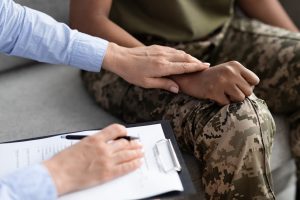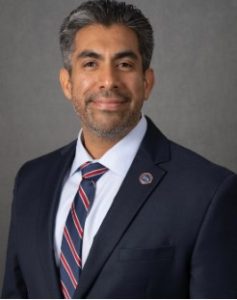U of C program helps veterans straighten out their lives
By Kevin Beese Staff Writer — February 5, 2025
First of two parts looking at efforts to help veterans who wind up in the Cook County court system
Navy veteran Greg Sanchez was struggling with the transition to civilian life.
He had issues with law enforcement. He was charged and convicted of three felonies.
“Veterans Treatment Court saved my life,” the former California resident said. “The resources provided helped me unpack my past, both in the military and before. I tapped into things I didn’t know were there.
“It took 18 months, but my record was cleaned up and my record was sealed. It gave me another chance at life. It was an alternative to going to prison.”
Fast forward six years and Sanchez is now one of those providing resources to help veterans in Cook County get their lives back on track. Sanchez is the liaison to the Veterans Restorative Justice Project at the University of Chicago.
The program provides tailored support for veterans who have criminal cases before the Veterans Treatment Court in Cook County.
Through University of Chicago professionals and academic units, the school’s Office for Military-Affiliated Communities and its partners provide research, U.S. Department of Veterans Affairs benefit assistance, policy recommendations, workforce development and readiness training, and assessment of services needed to reintegrate veterans into society.
Sanchez, who is assistant director of the OMAC program, said the Restorative Justice Project is a multi-modal approach.

Greg Sanchez
“We bring public defenders, county social workers, anyone who could be on the court calls into the room,” Sanchez said. “I offer lived experiences. I consider it a great honor and privilege to have my voice heard.
“I can relate to what the veterans are going through. I know the nuances. Some people just don’t see things because they have not lived it. I can fill in the gaps.”
Sanchez met Terrell Odom, director of the Office for Military-Affiliated Communities, at a conference at U of C. He told Sanchez about the Restorative Justice Project the school was starting and that he “might be a great help for the program.”
Sanchez jumped at the chance and is now in the U of C master’s program for public policy.
“I came from sunny California and here I am,” Sanchez said on a dreary winter day.
Sanchez works one on one with veterans in the Restorative Justice Project, being a mentor and providing peer support.
“I walk the journey with them,” he said.
The Veterans Restorative Justice Project liaison said the U of C program can be tough, with veterans sometimes having to tackle mental health and substance abuse issues as well as probation requirements.
“It can be stressful. It can be overwhelming,” Sanchez said. “I will fill in and say, ‘Hey, friend, let’s do this together.’ I am on the phone at different hours of the night…The framework is kinship.”
He noted that members of the VRJP are able to work one on one with veterans through the grants provided to the program.
The project does everything from connecting veterans with available resources to providing them with winter clothes and boots to teaching them financial literacy.
“We have a lot of irons in the fire to support veterans,” Sanchez said. “There is a lot of unaddressed or under-addressed military trauma.”
He said easing the transition back to civilian life is something that needs attention for those leaving military service.
“The Department of Defense and VA go back and forth on where service stops and transition begins,” Sanchez said. “When you’re still active duty, you keep your mouth shut. You don’t want to raise alarms. It’s the way the military culture is. It’s a tough person’s membership. It’s implied that you’ll bury emotions and feelings. You’re not wanting to make waves.
“When you transition and leave active duty, it is almost like you are left to your own recognizance.”
Sanchez said too often veterans struggle with the transition to civilian life.
“When you take off the uniform, you have to find your identify again,” he said. “The uniform no longer defines who you are. It’s a hard landing after being in the military. That landing should be soft and welcoming.”
If veterans take the treatment program seriously, Sanchez said, they can work through issues like Post-Traumatic Stress Disorder and depression.
“They can really tap into a level of healing that will open up a new life for them,” he said. “The scars will also be there and it’s almost a necessity that they will need mental health services for the rest of their lives.”
Sanchez said he is very open with his personal history.
“I want other veterans to hear it,” he said. “I had similar issues. I want them to know it’s OK to ask for help. Their health and well-being for the rest of their lives hinder on reaching out for assistance.”
The Oak Park resident said that often veterans also struggle with the loss of comrades.
“The ideology of our program is life is a beautiful thing. The best way to try to honor them is to live a good life,” Sanchez said. “Individuals we’ve lost want to see us lead a good and happy life. I chose the path of education. Others make other career choices.”
He said the program often gets veterans back in touch with family and friends.
“They rediscover relationships with them and others they did not spent so much time around,” Sanchez said. “The light goes off and they realize who their tribe is.”
The former resident of Chicago’s Southport neighborhood said he is thrilled to be able to attend Veterans Treatment Court graduations.
“The veterans who go through this start out with hopelessness and stress. Life is coming at them at full speed,” Sanchez said. “They go through the program and 18 months or two years later, they have a glow. They are smiling. They have reconnected with their parents or children.
“This program offers alternatives to incarceration. It is the very last resort. They find the treatment courts after committing crimes of desperation and homelessness. We are a country that believes in second chances. Therapy is not easy, but the support is there. We will be there to pick each other up.”
Sanchez encourages other counties to consider instituting programs like Veterans Treatment Court to help those who have served our country.
“America is coming off 20 years of being at war post 9/11. We still have a massive population of veterans,” Sanchez said. “For various reasons, they have been ushered into the shadows.
“Democracy is reliant on the brave who are ready to defend it. Rather than put them to the sidelines, put them center stage. Hug them and support them.
“Some of the toughest, most humble individuals will bury their emotions until they eventually act out. As a society, we miss the signals. We need to be emphatic for these individuals.
“Let’s have a conversation with the team from Cook County We all need to rise for justice for veterans. There is tremendous work being done helping veterans in the justice system.”
kbeese@chronicleillinois.com







